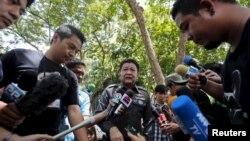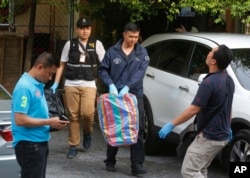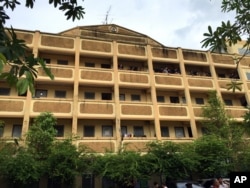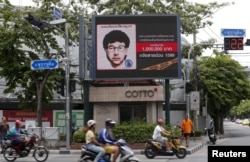Thai authorities are facing criticism after warning the media and the public not to disseminate a photograph of a suicide vest aired nationally the day before.
All Thai television channels carried a brief broadcast by the military junta at 6 p.m. Saturday announcing the arrest of a suspect in connection with the bombing of a Bangkok shrine earlier this month that killed 20 people.
During the broadcast a picture of the suspect, only identified as a 28-year-old “foreign man” was displayed along with photos of what junta spokesman Colonel Winthai Suvaree said were seized materials linked to the bomb-making, as well as a stack of Turkish passports.
At 3:44 into the special broadcast, a vest with bulging pockets connected by wires was displayed although Winthai did not specifically reference that item which remained on screen for less than three seconds.
Reporters and other on social media quickly noted that the picture was taken from a March 2013 online blog of the U.S. Transportation Security Administration.
The Thai national police, later on its Twitter social media account, declared the vest photo had nothing to do with the Bangkok bombing investigation and warned anyone republishing it online could face charges under the Computer Crime Act.
No explanation
Authorities did not elaborate on how it had been intermingled with photos purportedly taken Saturday at the suspect’s apartment and who was responsible for its inclusion in the junta’s broadcast announcement which every channel was mandated to carry.
Sean Boonpracong, former national security adviser to ousted prime minister Yingluck Shinawatra, on his Twitter account on Sunday, called for the National Council for Peace and Order – the junta’s formal name – to enlighten the public about the mixup and “improve your credibility please!”
Other Thais on social media also noted how the incident had further undermined the credibility of those conducting the investigation.
Everyone should refrain from criticizing the police and security efforts with the bombing investigation to avoid damaging the kingdom’s reputation, said Colonel Winthai in a statement he read on all channels at 6 p.m. Sunday.
Human Rights Watch and other groups expressed concern following the August 17 bombing about how the lack of legitimate political, security and judicial authority in a country under military government could undermine public trust in the investigation’s outcome.
Confusing investigation
The mystery about the photograph is the latest confusing element to the investigation of the fatal shrine blast which killed and injured not only Thais, but dozens of foreign visitors.
The bombing was the worst single mass casualty attack in Thailand.
Immediately after the arrest of a suspect in an apartment on the eastern outskirts of Bangkok police said the man was Turkish but then backtracked when it was point out the picture they released of his passport was a mistake-riddled forgery.
The Turkish Embassy in Bangkok denied that arrested suspect is a citizen of Turkey, police Lt. General Prawut Thawornsiri told reporters on Sunday.
Authorities also made conflicting statements Saturday and Sunday on whether they believed the man was the suspect caught on closed circuit television images leaving a package at the popular Hindu shrine in central Bangkok just prior to the explosion.
Police initially told reporters that a tip from a landlord had led them to the suspect, whose apartment building was surrounded by more than 100 police and soldiers on Saturday.
Other officials later were quoted anonymously in the Thai media saying police analysis of mobile phone records had led them to the man.
Two rooms in the apartment building the suspect was using were strewn with bomb-making ingredients, including urea fertilizer, TNT, C4 and sodium carbonate, according to a plain-clothes special branch officer quoted by Reuters.
Bomb-making materials – including fuses, pipes and ball bearings – found at the apartment Saturday, police earlier said, were similar to those used at the Erawan Hindu Shrine and were linked to a second bombing the following day which caused no injuries at the Sathorn Pier.
A search warrant was executed at a low budget apartment block in Bangkok on Sunday, near the Al Madanee Mosque.
Information from the suspect being held by military authorities suggested that the Maimuna Garden Home apartments were used by his associates, said Colonel Kanchol Intraram, chief of the Min Buri police station.
Officers on the scene told reporters nothing suspicious was found but the Bangkok Post reported a welding tool was taken for further examination.
'Not international terrorist act'
The Thai national police chief told reporters Saturday evening that the attacks were “not an international terrorist act.”
The motive by the main culprit was instead "taking personal revenge for his comrades,” asserted Police General Somyot Pumpanmuang, without elaborating on how authorities had quickly reached that conclusion.
Police on Sunday described the suspect as part of a gang of people smugglers.
"They are unsatisfied with police arresting illegal entrants," General Prawuit told Thailand’s Channel 3.
The head of the Thai military junta, Prime Minister Prayuth Chan-ocha, has cautioned against concluding that the shrine bombing was linked to international terrorism or mentioning any possible connection to Turkey.
In recent days speculation had increased about the bombing’s possible link to China's ethnic Uighur minority or their co-religious sympathizers in Turkey.
Thailand’s military government last month forcibly repatriated more than 100 Turkey-bound Uighur refugees to China, a move condemned by international human rights groups.
That led to an attack on the Thai consulate in Istanbul where windows were smashed.
Thai authorities since the bombing have denied to VOA that Chinese – regular visitors to the Erawan Shrine – were likely the primary target of the bombing.
Pueng DuangKae contributed to this report.









